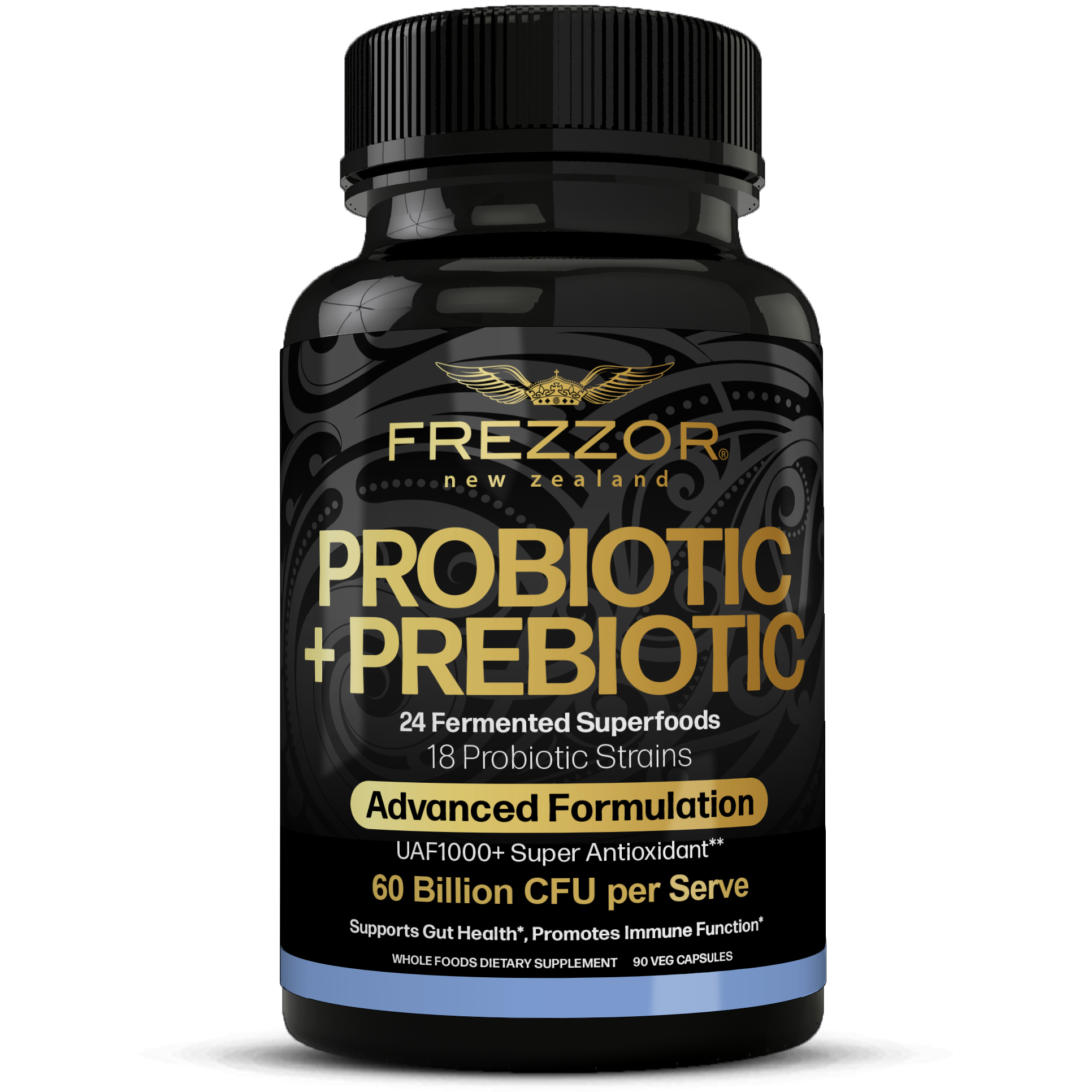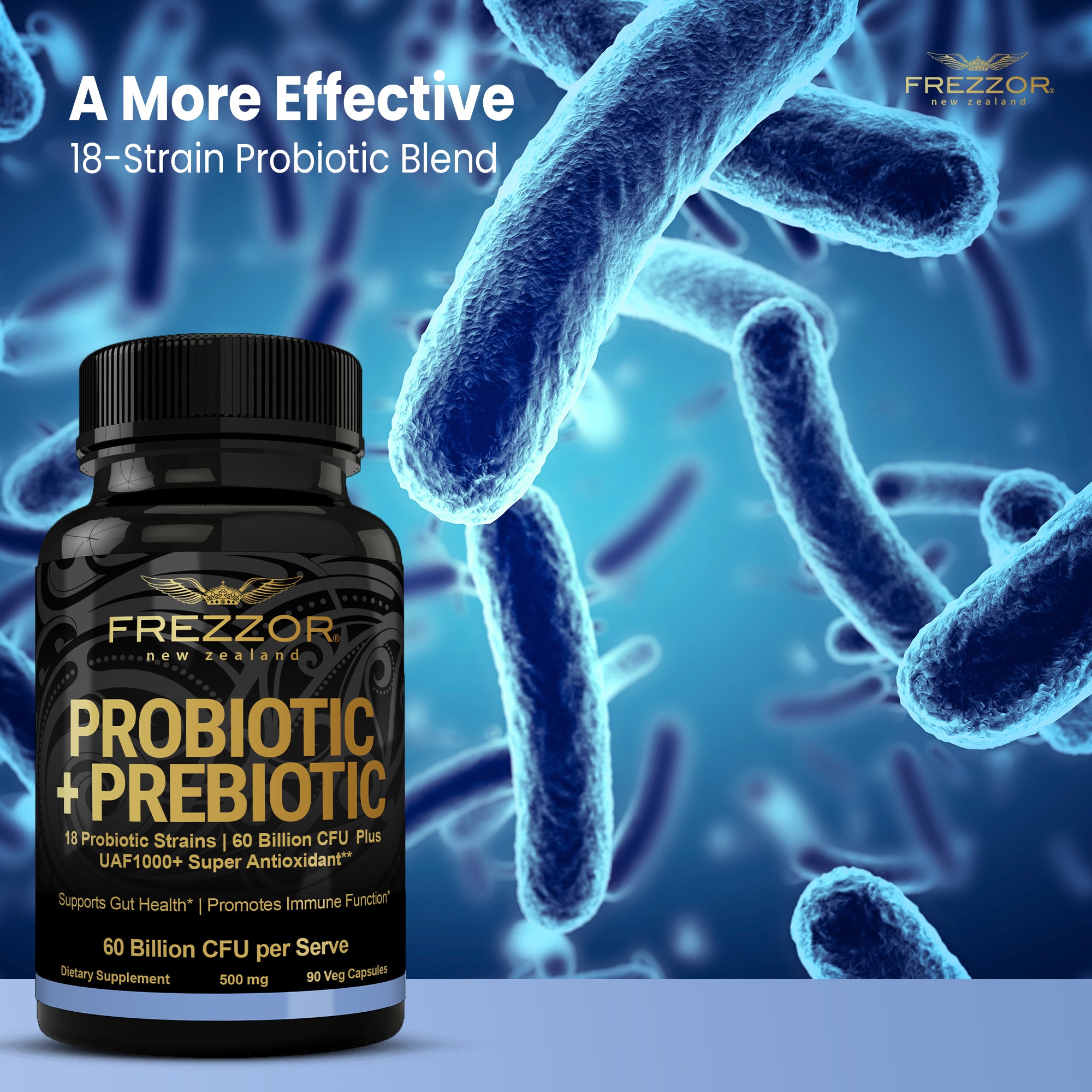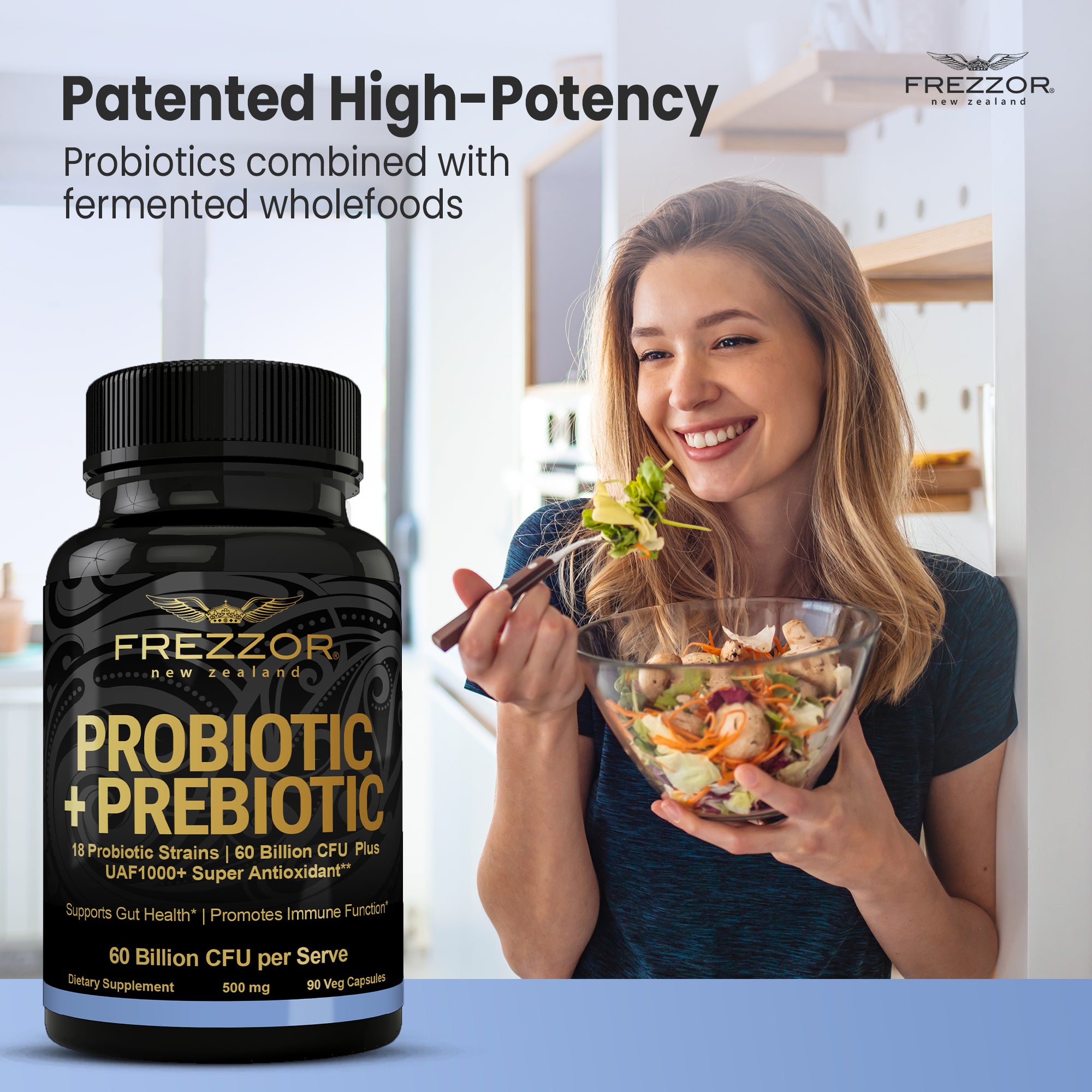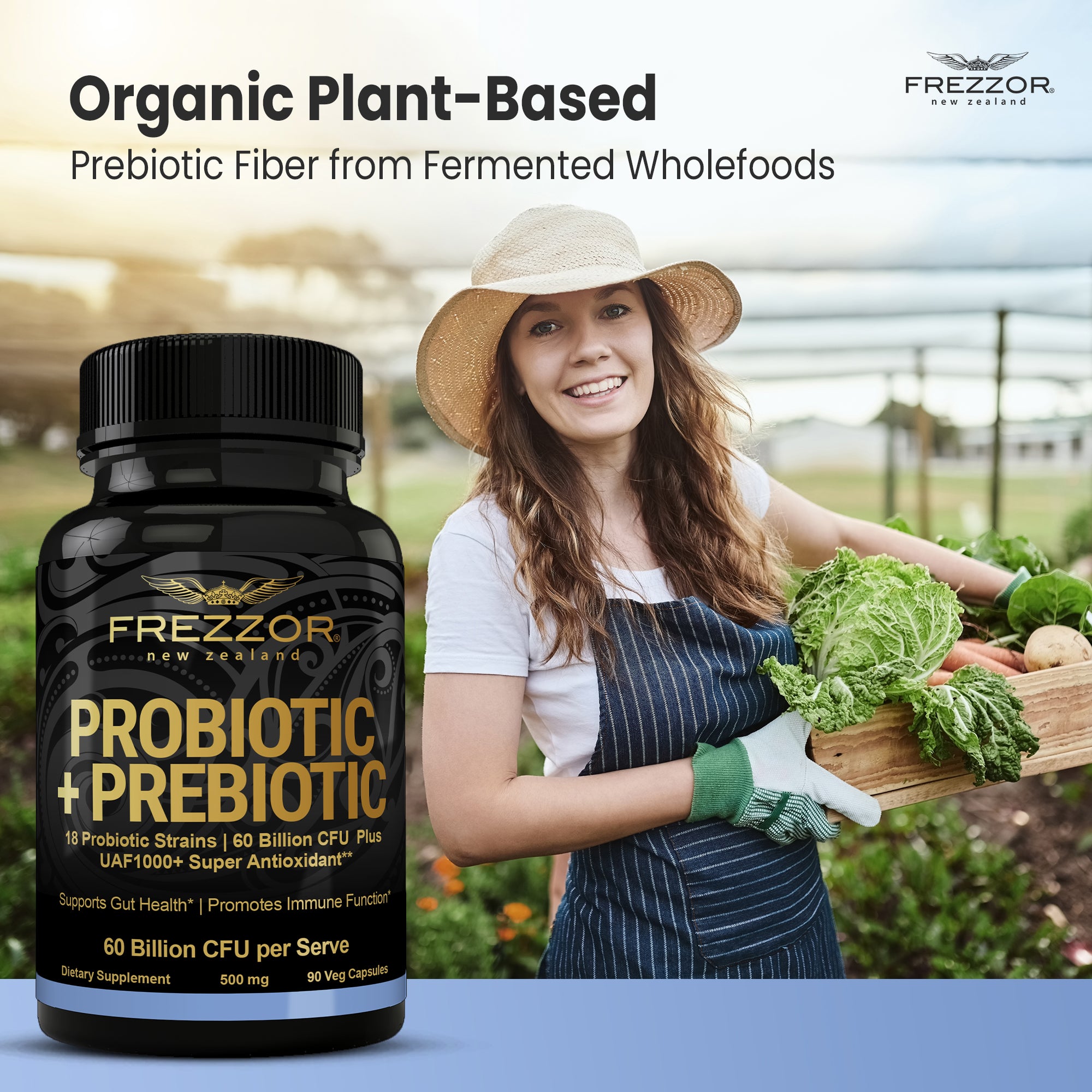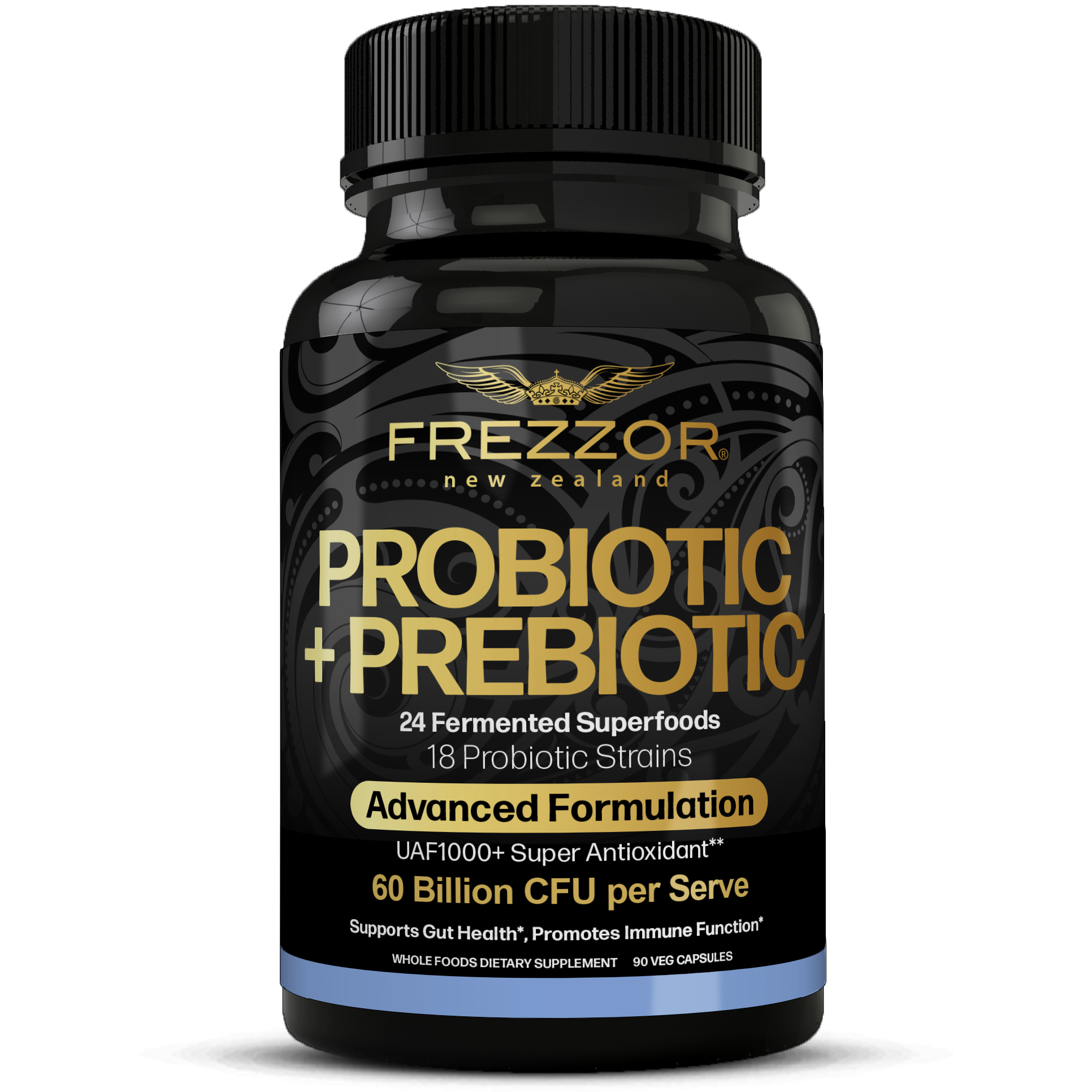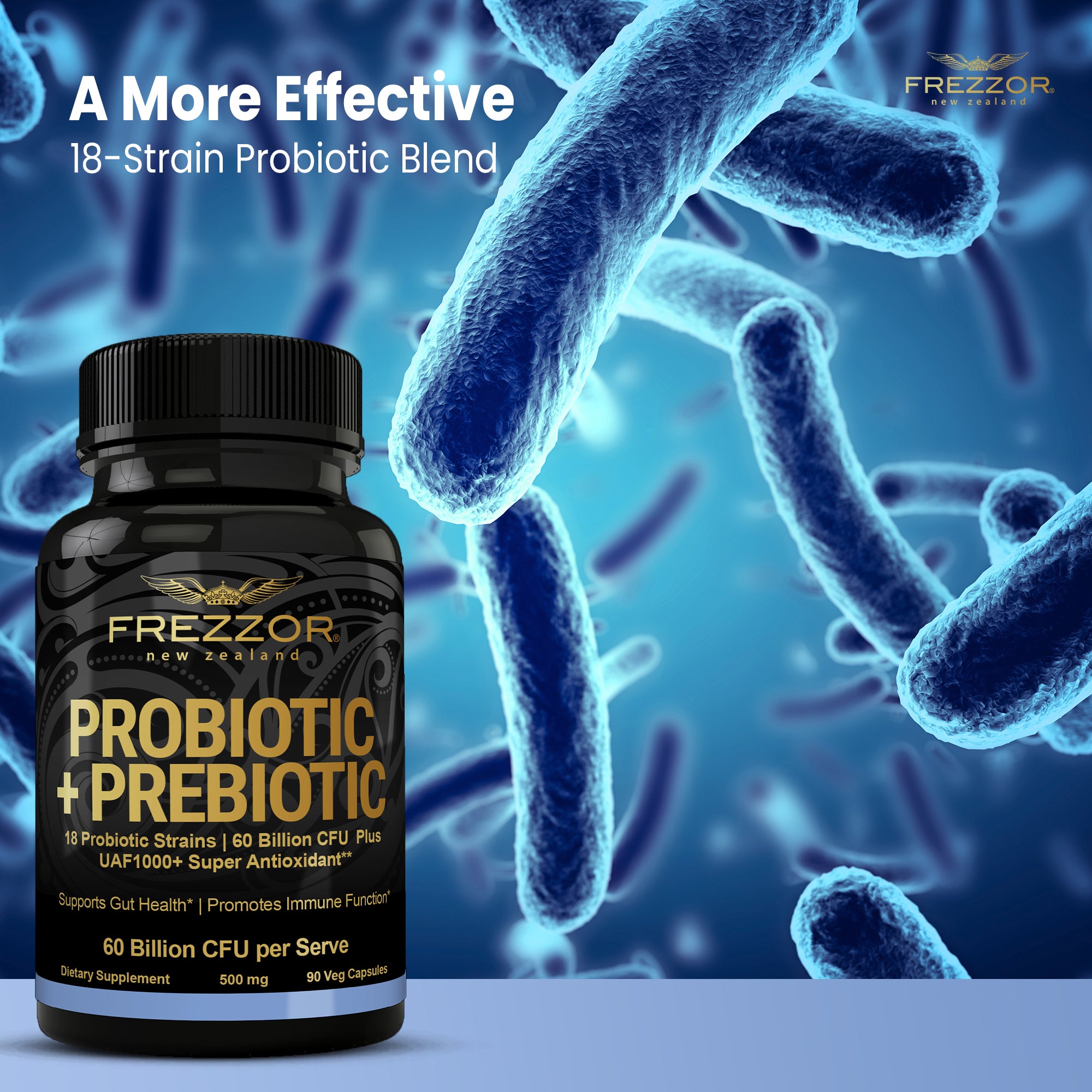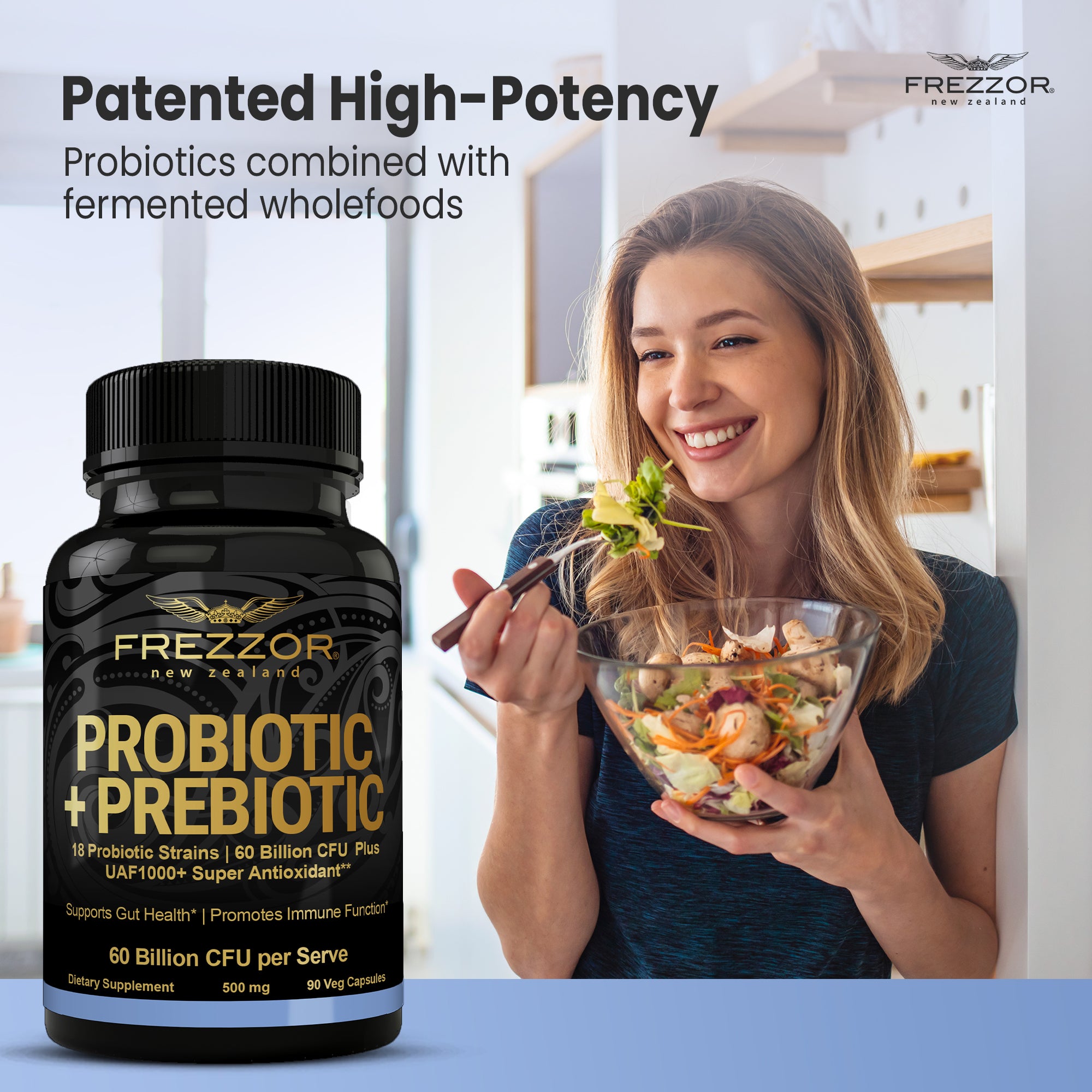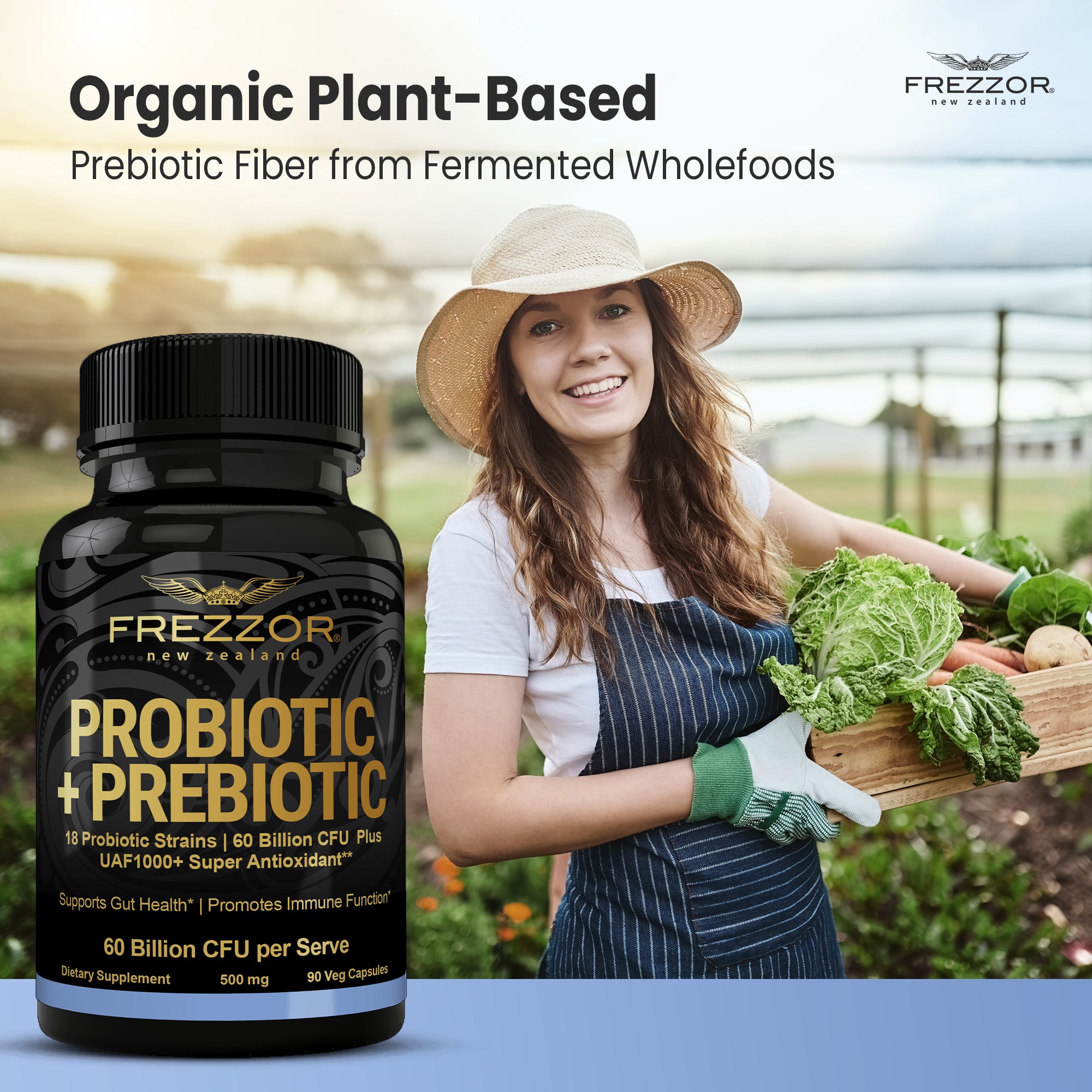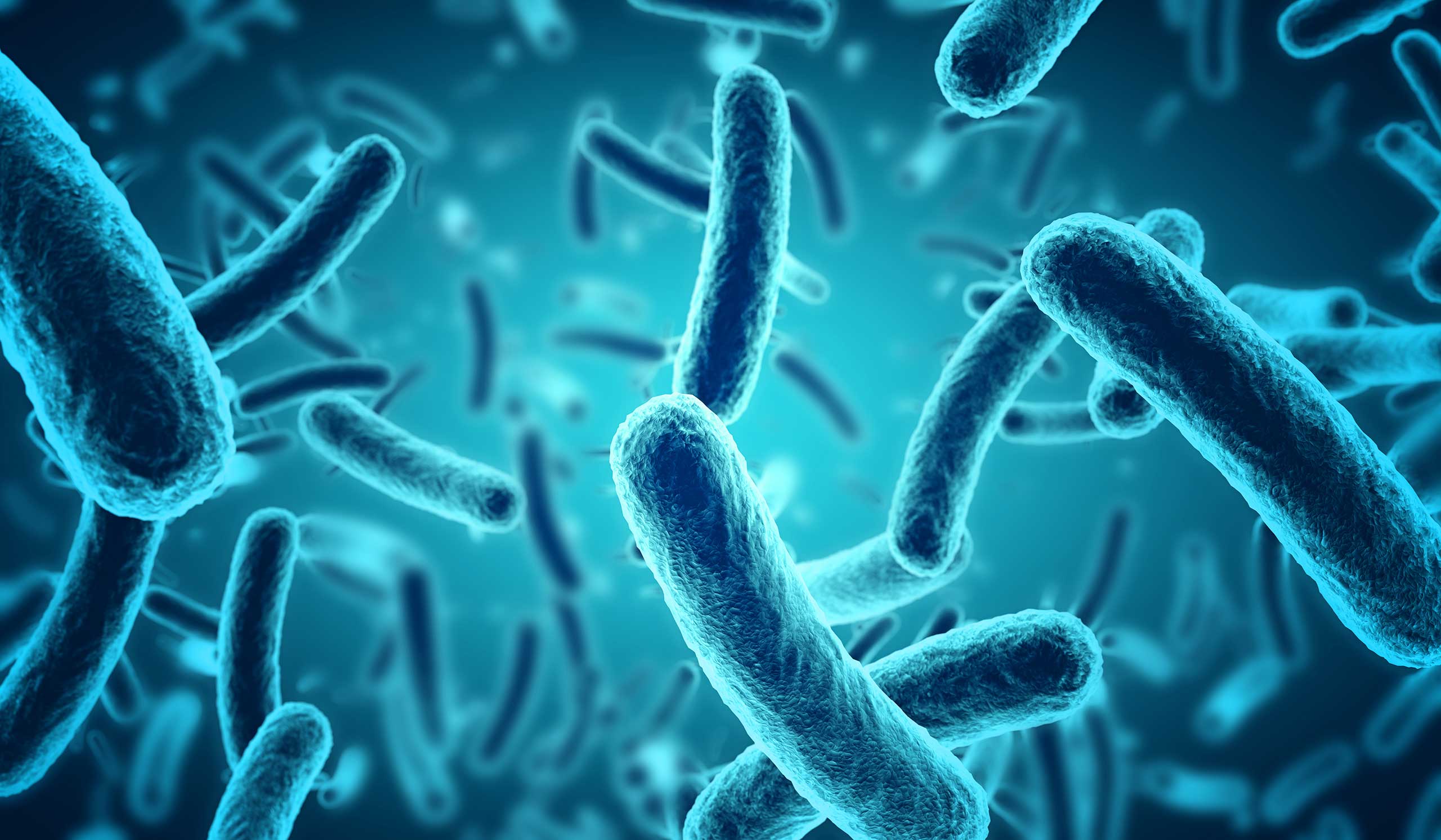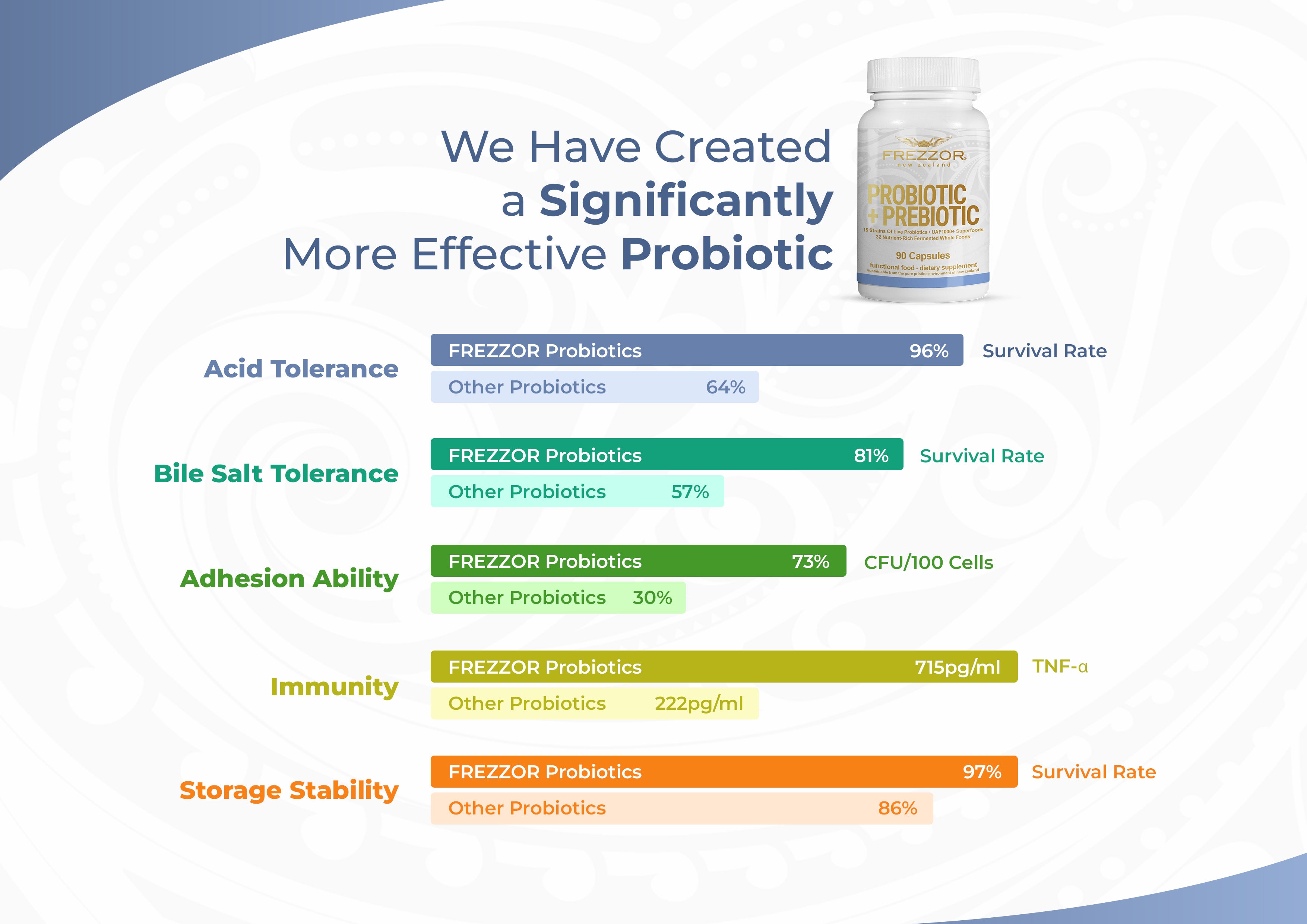FREZZOR PROBIOTIC +PREBIOTIC provides you with an optimal combination of 60 billion live probiotic bacteria and fermented raw whole foods prebiotics, combined with essential amino acids, digestive enzymes and whole food nutrition to improve your health and well being.
FREZZOR PROBIOTIC +PREBIOTIC is the perfect blend of advanced probiotics and fermented whole foods.
This unique combination offers several advantages over single strain probiotics, and these benefits include:
• the pre-digestion of complex foods, which improves the absorption of many vitamins,
• enhanced mineral bioaccessibility and increased bioavailability of antioxidants,
• a significant alkalizing effect on the body's pH;
The probiotics, which are associated with fermented foods used in FREZZOR PROBIOTIC +PREBIOTIC have been associated with a variety of health benefits,
1. improved digestion and superior gut health,
2. better immunity,
3. increased weight loss
OUR INGREDIENTS IN FREZZOR PROBIOTIC +PREBIOTIC
We have three Major Components
1. We start with a leading blend of 18 strains of probiotics, which delivers a FULL 60 billion live organisms (CFUs) with every dose.
2. We combine that with some of the best antioxidant-enriched, Non-GMO and Non-Gluten prebiotic plant fiber that we could find to help feed and support our probiotics
3. We finish off our formulation with a range of 23 fermented wholefoods which have their own additional probiotics and prebiotic plant fibers.
Making this the best PROBIOTIC +PREBIOTIC Formulation we could make.

We developed a Superior Probiotic Blend containing more than 60 Billion live organisms, including;
Lactobacillus plantarum, Lactobacillus rhamnosus, Lactobacillus casei, Lactobacillus fermentum, Lactobacillus reuteri, Lactobacillus acidophilus, Lactobacillus paracasei, Lactobacillus delbrueckii subsp. bulgaricus, Lactobacillus gasseri, Lactobacillus helveticus, Lactobacillus salivarius, Lactococcus lactis subsp. lactis, Streptococcus thermophilus., Bifidobacterium animalis subsp. lactis, Bifidobacterium longum, Bifidobacterium breve, Bifidobacterium bifidum, Bacillus coagulans

We have added a Specialized Antioxidant and Fiber Blend to support our Probiotics.
Sunfiber Guar Gum Seed
Kiwifruit Enzyme
Broccoli Sprout
UAF1000+® Superfood Antioxidant

Our Fermented Wholefood Prebiotic Powder Is Made From 23 Superfoods
Mung Beans, Chick Peas, Brown Rice, Red Lentils, Linseed, Spirulina, Barley Grass, Alfalfa Grass, Quinoa, Chia Seed, Amaranth Grain, Asparagus, Beetroot, Broccoli, Chicory Root, Onion, Sweet Potato, Dunaliella Salina, Fresh Ginger, Shitake Mushroom, Cordyceps, Reishi Mushroom, Molasses
15 STRAINS OF LAB PROBIOTICS (LACTIC ACID-PRODUCING BACTERIA)
During The Fermentation Of Our Wholefood Prebiotic, we use 12 Strains from 3 different classes of probiotics:
Lactobacillus acidophilus, Bifidobacterium bifidum, Lactobacillus casei, Lactobacillus helveticus, Lactobacillus bulgaricus, Lactobacillus leichmannii, Lactobacillus caucasicus, Lactobacillus lactis, Lactobacillus fermenti, Lactobacillus brevis, Lactobacillus plantarum, Lactobacillus delbruekii,
1 strain of an SBO probiotic (Soil based organism):
Bacillus coagulans
2 strains of beneficial yeast probiotics:
Saccharomyces boulardii, Saccharomyces cerivisiae.
Our Probiotics are a Unique Blend that Provide the Following Benefits:
• Excellent colonization, which means the probiotics remain effective, longer.
• Production of beneficial fermentation compounds which modulates immunity and stimulates cellular repair.
• Supports overall gastrointestinal health and wellness.
• Improves digestion and nutrient absorption from food which is better for your health and you generally eat less.
The Major Health Benefit of Probiotics.
The Major Health Benefit of Probiotics.
Every month new studies are being published on the beneficial effects of probiotics and how the right balance of bacteria throughout your gut is strongly linked to your overall health and the future risk of certain diseases.
Probiotics are the beneficial bacteria commonly found in a healthy human digestive system that replace and rebalance the lost or missing bacteria of the gut These probiotics promote a healthy balance of gut bacteria and are associated with an extensive variety of health benefits.
The Major Health Benefit of Probiotics.
Every month new studies are being published on the beneficial effects of probiotics and how the right balance of bacteria throughout your gut is strongly linked to your overall health and the future risk of certain diseases.
Probiotics are the beneficial bacteria commonly found in a healthy human digestive system that replace and rebalance the lost or missing bacteria of the gut These probiotics promote a healthy balance of gut bacteria and are associated with an extensive variety of health benefits.
What are Fermented Whole Foods
Fermentation is a natural process where certain beneficial microorganisms, such as those probiotic bacteria found in FREZZOR PROBIOTIC +PREBIOTIC, are able to convert the carbohydrates (and sometimes the protein) found in plants into an easy to digest, nutrient-rich food. As the fermentation progresses, it releases many of the vitamins, minerals and phytonutrients that would otherwise pass through our gut, undigested.
The process of fermentation has been used for centuries because the acid produced by the fermenting bacteria often kills other microorganisms that would spoil the food. This practice is still used today to produce foods like yoghurt, beer, wine, cheese, and kombucha and sauerkraut.
The acids produced by the "lactic acid-producing" probiotic bacteria (called LAB Probiotics) act as a natural preservative, giving fermented whole foods a very distinct zest and desirable tartness.
Not only does fermentation help improve the preservation and storage of food, but consuming fermented whole foods will greatly increase the number of beneficial bacteria in your gut.
Health Benefits of Fermented Foods
A number of health benefits are associated with fermentation. In fact, fermented foods are often more nutritious than their unfermented form.
THREE Key Health Benefits of Fermented Foods.
Improves Digestive Health
The probiotics produced during fermentation will restore and rebalance the friendly bacteria throughout your digestive system and can often reduce the systems of some common digestive ailments
M L Ritchie, 2012 [https://pubmed.ncbi.nlm.nih.gov/22529959/]
Including the troublesome and difficult to alleviate symptoms of irritable bowel syndrome (IBS), a common digestive disorder
N Hoveyda, 2009 [https://pubmed.ncbi.nlm.nih.gov/19220890/]
Fermented foods have also been shown to reduce the severity of diarrhoea, bloating, gas, and constipation
E Dimidi 2014 [https://pubmed.ncbi.nlm.nih.gov/25099542/]
So, getting more fermented whole foods into your diet is an excellent idea if you regularly experience these types of gut issues.
Boosts Your Immune System
The bacteria that occupy our digestive tract (called our microbiome) have a significant influence over our health, and in particular, on our immune system.
Fermented whole foods can give your immune system a significant lift because of their high probiotic content. Additionally, fermented whole foods reduce your risk of infections like the common cold
M Ozen, 2015, [https://pubmed.ncbi.nlm.nih.gov/25430686/]
Furthermore simply eating probiotic-rich foods such as Fermented whole foods are known to help those recover, faster after sickness. S King 2014, [https://pubmed.ncbi.nlm.nih.gov/24780623/]
Makes Food Easier to Digest
The fermentation process is able to break down carbohydrates and other nutrients from plants, making these nutrient-rich whole foods much easier to absorb and digest than similar non-fermented foods.
One of the best-known examples is the fermentation of the milk sugar called lactose, which is found in most dairy products. Lactose which is a complex sugar is broken down by lactic acid-producing during the fermentation process into simple sugars for easy absorption.
This means that people who suffer from lactose intolerance (the inability to digest lactose) should have few problems consuming fermented dairy products like yoghurt and kefir.
Another way that fermentation makes food easier to digest, is by helping to break down and destroy compounds that are called "anti-nutrients" that can block the absorption of many essential nutrients from the diet (eg "anti-nutrients" like phytates from grains and lectins from legumes).
Anti-nutrients are naturally occurring plant compounds, which have evolved to discourage grazing animals from consuming them. They are found in types of foods such as legumes, nuts, grains and seeds where they interfere with the nutrient absorption from within other foods. Fermentation is a great strategy to minimize the impact that these anti-nutrients have on the body.
Our FREZZOR PROBIOTIC +PREBIOTIC offers the following probiotic benefits
• Excellent colonization, which means the probiotics remain effective, longer.
• Production of beneficial fermentation compounds which modulates immunity and stimulates cellular repair.
• Supports overall gastrointestinal health and wellness.
• Improves digestion and nutrient absorption from food which is better for your health and you generally eat less.
Human Microbiome: The Importance of Our Gut Bacteria
The 'Human Microbiome' is the term used to describe the collection of all microorganisms, including bacteria and yeasts that live in and on the human body. The gastrointestinal tract has the densest and most diverse microbial community of the human body.
In 2003, the Human Genome Project was completed. The objective of this project was to map and understand how the genes in the human body contributed to our collective health and wellness and surprisingly; it was soon discovered that our inherited genes could only explain about 10% of human disease.
The remaining 90% of human diseases are induced by environmental factors, deficiency of nutrients, toxins, or even emotional and psychological disturbances.
In recent years there has been a growing body of evidence, which shows our gut microbiome is one of these important environmental factors, capable of turning our genes on or off, depending on the types of bacteria that are present.
Our gut microbiome is as unique as a human fingerprint and can be rapidly changed and modified based on factors such as diet, lifestyle, and exposure to toxins and antibiotics.
Sometimes changes we make to our diet and lifestyle will influence our gut microbiome in ways that result in improvements in overall health, but all too often, these changes cause a decline in overall health and wellness.
Probiotics when consumed regularly and in sufficient amounts, support and strengthen our gut microbiome and confer health benefits when they are consumed.
How to Use
How to Use
Take THREE (3) capsules daily or more as needed.
How to Use
Take THREE (3) capsules daily or more as needed.
FAQ
FREZZOR Probiotic +Prebiotic
What are probiotics and prebiotics, and why are both essential for our gut?
Probiotics are microorganisms, the smallest living things or "good" or beneficial bacteria that reside on or in our intestines. Prebiotics are fiber and, at the same time, the proper and vital food for probiotics. Without prebiotics, beneficial bacteria, or probiotics, cannot survive.
What foods count as Fermented Foods?
Fermented foods include anything fermented, such as plain yogurt, kefir, buttermilk, sauerkraut, kombucha, miso, kimchi, apple cider vinegar, pickles, and yeast; in other words, anything that is fermented.
Did you know this about your intestines?
The intestine is the largest and the longest internal human organ, measuring up to 7½ meters. Even though the diameter of the intestine is only a few centimeters, your gut contains folds, millions of villi, and billions of microvilli whose total surface area is estimated to be between 250 and 500 square meters. Quite large, considering that a tennis court measures about 260 square meters. The fact that your intestine is so large has a sensible reason because during an entire lifetime, about 30 tons of food, toxins, microbes, pathogens, and indigestible substances and 50,000 liters of liquid pass through the intestine. To digest these quantities of food, a large contact area of the intestine with the food is therefore beneficial.
What are the tasks of the intestine?
The tasks of the intestine are many. It ensures the breakdown of food and the optimal absorption of essential substances into the body. In doing so, it must distinguish which food components enter the body and which food residues must be excreted again to relieve the body of harmful pollutants.
In addition, the intestine produces hormones and plays a significant role in regulating the water balance, which requires reabsorbing and excreting large amounts of fluid. One of the most important roles of the intestine is that it serves as a protective barrier for pathogens, which is why it's so important that you take care to keep your intestinal wall healthy, as well as your little beneficial billions of roommates, meaning your bacteria.
So the gut has several quite demanding tasks vital to your health. With FREZZOR Probiotic+Prebiotic, we want to help you maintain and promote your gut health.
What is the microbiome?
The microbiome is the sum of all microorganisms, tiny living things such as bacteria, and other single-celled organisms located on or in our human body. Humans have more living bacteria in their bodies than cells, about 390 trillion, the equivalent of about 2 kg of our body weight. 99% of the bacteria are found in our intestines, where there are about 1000 different species of bacteria. Bacteria have some essential tasks for the human body. They play an important role in digestion, production of vitamins, and defense against pathogens, and contain harmful germs. They also have a significant impact on our immune system.
Why is it so important to keep our gut flora healthy?
Intestinal health is of utmost importance to everyone. The intestines can be massively affected by years of consuming nutrient-less, industrially processed foods and medications such as antibiotics. Because once the intestinal health is out of balance, unpleasant symptoms can develop due to "bad" harmful intestinal bacteria and secondary diseases such as "leaky gut." Once the balance of the intestinal flora is disturbed, a so-called dysbiosis can quickly develop, in which undesirable microorganisms spread and take control. As a result, inflammatory processes of the intestinal mucosa occur. So it is crucial to have a healthy intestinal flora and intestinal mucosa, as well as a functioning intestinal-associated immune system and also an optimal interaction of all these components.

